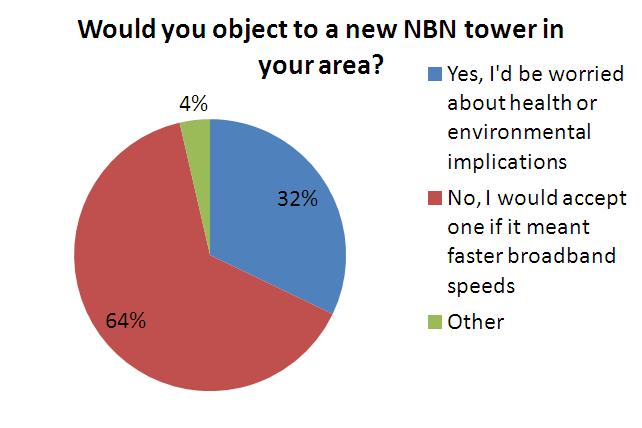- Some areas of Australia will get fixed wireless services on NBN instead of fibre
- Of 610 respondents, around two thirds would not object to a new tower
- Poll shows less opposition to new mobile towers than feared
The majority of Australians would not object to a new National Broadband Network (NBN) tower in their area if it meant they could access faster internet, according to a poll.
Broadband comparison website Compare Broadband asked site visitors "Would you object to a new NBN tower in your area?" Of the 610 people who responded to the poll, around two thirds (64%) said "No, I would accept one if it meant faster broadband speeds" while 32% said they would object over environmental or health concerns, and the remainder were not sure.
Compare Broadband spokesperson, Sarah McDonald, said: "The NBN Co has warned that the roll-out of the NBN in rural areas could be delayed due to objections to new towers but this poll shows opposition may not be as strong as feared."
Although 93% of the Australian population will connect to the NBN through fibre optic cables, 4% will connect to a 4G fixed wireless network, with the remaining 3% covered by satellite services. The fixed wireless network will serve smaller, rural communities where installing fibre cabling has been deemed to be too expensive.
Those connecting to the internet on the NBN Co's fixed wireless network will receive a 12Mbps connection, which will be faster than an ADSL or current mobile broadband plan. The 5 locations where work has commenced for connection to fixed wireless are Tamworth in NSW, the Darwin region in NT, Toowoomba QLD, Ballarat region VIC and Geraldton region WA. The fixed-wireless roll out is expected to be completed by 2015 and will require the construction of new mobile towers, up to 40 metres tall.
However, NBN Co has faced opposition to plans for new towers from communities involved in the initial roll out, over health concerns or perceived negative impact on the environment. Several groups of residents near Ballarat in Victoria have lodged protests against plans to build 20 new towers in the area.
Rhonda Griffin, spokesperson for NBN Co, said each new proposed site is assessed for its predicted Electromagnetic Energy (EME). The EME from NBN equipment is only a small fraction of acceptable safety limits.
"This is because the power required to operate a fixed broadband network is really very low, particularly when compared to the power levels required by TV and radio broadcasts," Ms Griffin said.
According the World Health Organisation (WHO), there is no convincing scientific evidence that the signals from mobile towers cause adverse health effects.
NBN Co chief executive Mike Quigley has warned councils who ultimately reject planning permission for the structures would be restricting their communities to slower satellite connections at maximum speeds of 6Mbps. The roll out of the fixed wireless network could also be slowed by planning permission delays, according to Mr Quigley. 


